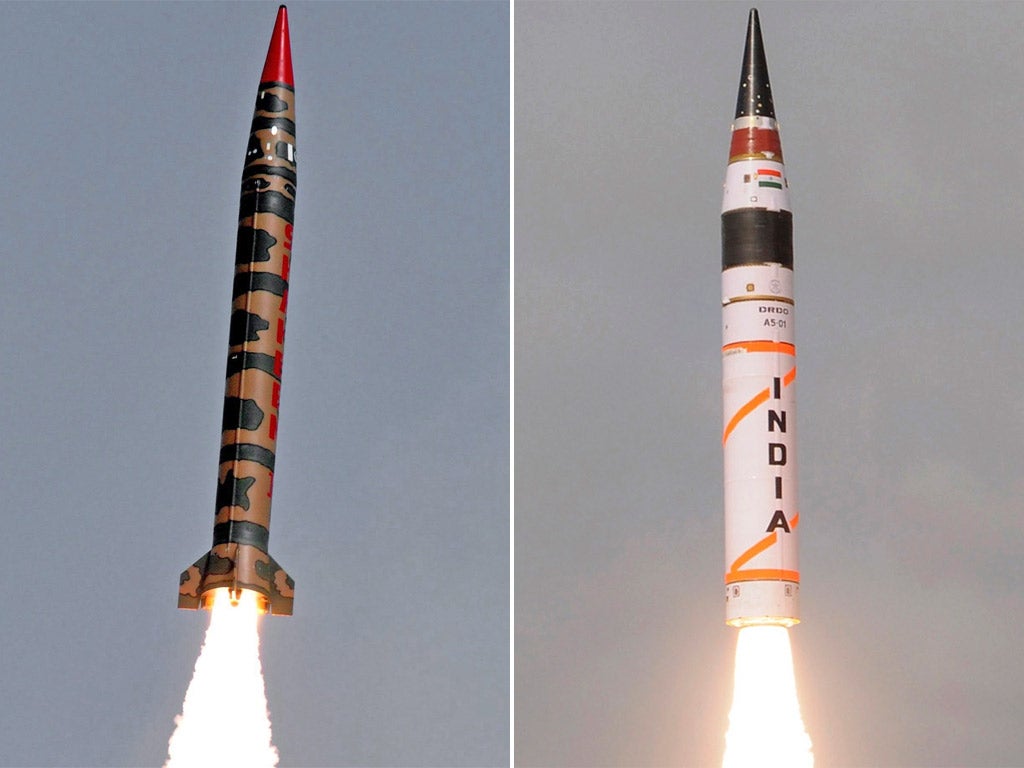Anything you can do... Pakistan follows India with its own missile test
Launch is latest proof of escalation of arms in Asia as new report stresses the threat to rest of the world

A week after India successfully tested a long-range missile, Pakistan yesterday said it had also fired an upgraded nuclear-capable device in a reminder of the ongoing arms race that has gripped Asia.
Officials in Pakistan said they had completed a positive trial of the Shaheen-1A, an intermediate range missile that is capable of reaching targets across India. Officials said the missile came down in the Indian Ocean.
The test came a week after India trialled the so-called "game-changing" Agni-V, which, for the first time, would allow it to target many of China's major cities. While officials said the weapon was not "target-specific", analysts said it had been designed to counter a perceived threat from Beijing.
Talat Masood, a former army general based in Islamabad, said: "As you are aware, [India and Pakistan] have both been pursuing these nuclear and missile programmes for some time and will do so for some time to come. India has reached the point where it can target most of China. Pakistan also wants to develop its longer range weapons and increase its inventory."
Asked whether the timing of the Pakistan's launch was coincidental, he added: "It could have been coincidence. [But] it may have been a way of saying to the world, 'We have a missile programme too'."
The launch came as campaigners in the US warned in a study that a billion people around the world could starve to death if India and Pakistan were involved in a nuclear exchange, saying that even a "limited" war would cause deadly major climate disruptions.
The study, produced by the International Physicians for the Prevention of Nuclear War, said corn production in the US would decline by 10 per cent for a decade and soybean production would similarly drop by about 10 per cent. Rice production in China would fall by 21 per cent in the first four years.
"It is not just the arsenals of the US and Russia that pose a threat to the whole world," the report's author Dr Ira Helfand, told the Agence France-Presse. "Even these smaller arsenals pose an existential threat to our civilisation, if not to our species."
The South Asian neighbours, neither of whom are signatories to the nuclear non-proliferation treaty, have gone to war three times since 1947. In 2002, some analysts believed they were on the brink of another conflict. They regularly conduct missile tests and inform each other in advance.
While Pakistan's nuclear arsenal is believed to be the fastest growing in the world, neither its tests nor those of India receive the sort of condemnation heaped on North Korea for carrying out similar trials.
Asia has steadily become the focus of a multi-billion dollar arms race. Last month, the International Institute for Strategic Studies in London said arms spending by Asian nations will this year for the first time overtake that of European countries, where economic woes have forced a slowdown. It added that beyond India, China and Pakistan, Australia, Indonesia, Japan, Malaysia, Singapore, South Korea, Thailand and Vietnam were also spending heavily.
The trial of Pakistan's missile came a day before the country is to face another test. Today, Prime Minister Yousuf Raza Gilani, pictured left, is due to appear before the supreme court to hear its decision on whether he is guilty of contempt for failing to request the reopening of a corruption probe into the nation's president, Asif Ali Zardari, by the authorities in Switzerland.
Many observers believe Mr Gilani, who has pleaded not guilty and insists Mr Zardari enjoyed immunity, will be found guilty. Although he will almost certainly appeal against the court's decision, he could be forced to stand down.
Subscribe to Independent Premium to bookmark this article
Want to bookmark your favourite articles and stories to read or reference later? Start your Independent Premium subscription today.

Join our commenting forum
Join thought-provoking conversations, follow other Independent readers and see their replies